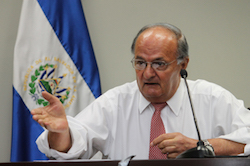Amidst rising violence in El Salvador, a new problem has emerged: contradictory narratives from the police.
According to ElSalvador.com, sources within El Salvador’s police intelligence said that leaders of the country’s largest gangs, the MS13 and Barrio 18, have been scheming for weeks to launch a combined assault against the government, with gang members waiting for the “green light” to proceed as planned.
Intelligence reports — said to be based on intercepted communications between gang leaders — revealed, as the news source put it, “The gangs are hoping to take more aggressive actions and are planning an alliance between themselves.”
Such a coordinated offensive would consist of increasing homicides and attacking “public employees, state infrastructure, and parts of the private sector,” and would be meant to demonstrate to the government the gangs’ strength.
The stated impetus for such collaboration are the recent transfers of gang leaders to the maximum-security prison in Zacatecoluca, as well as the recent deaths of gang members during confrontations with police and soldiers. The transfers put an official end to a multi-year effort to forge a truce between the MS13 and the Barrio 18.
SEE ALSO: Coverage of El Salvador’s Gang Truce
Nonetheless, ElSalvador.com also reported not all elements of the two gangs agree with forming a common front.
What’s more, a top level police official, contacted by InSight Crime, denied the supposed intelligence of the report, stating simply that there was no possible alliance between the two gangs, which have fought each other for decades (for reasons the gang members no longer even remember).
InSight Crime Analysis
The report about a gang alliance needs to be taken in the context of what is essentially an ongoing crisis in the government about how to deal with the gang issue following the dissolution of the truce. There are no easy answers, and hawkish positions seem to be winning the day on all sides, especially since the violence seems to be getting worse.
In recent days, armed attacks by suspected gang members against military targets have left three dead and another three injured, bringing the total number of soldiers killed in 2015 to six. This past weekend, a total of 34 people were murdered in El Salvador.
To combat this rise in violence, on April 18 President Salvador Sanchez Ceren announced the creation of three battalions — consisting of a total of 1,200 members of the armed forces — to fight crime in El Salvador’s most dangerous municipalities.
On April 20, Hato Hasbun — assigned by Ceren to oversee a special public security council — announced the formation of a special “Cleansing Battalion,” to be made up of 200 members of the National Police (PNC).
Hasbun said this unit will be distinct from the three armed forces battalions, but the two will “be working in a coordinated fashion.” No further details have been given, however, regarding the unit or its envisioned function.
SEE ALSO: El Salvador News and Profiles
The government has also said it will mix the prison population. Since the early 2000s, gang members have been sent to prisons where their cohorts were housed. But now the government will move some top- and mid-level leaders of Barrio 18 to a prison where members of the MS13 are jailed; it will also send top- and mid-level MS13 leaders to what was a Barrio 18-controlled jail.
While the ElSalvador.com report rightly suggests the gangs’ leadership in the jails continues to communicate even though the truce between them has disintegrated, it is difficult to imagine the gangs possessing the ability to put aside their differences and personal interests in order to coordinate a unified armed offensive.
Even if those in jail can agree they share a common enemy in state security forces, the gang members in the street have their own dynamic and share a deep distrust of their long-time gang adversaries.
On the other side of the equation, the government appears to be taking an even more radical position with each passing day of violence. Top government officials have stated that police should use their weapons against criminals “with complete confidence,” and that if more gang members were shot in “legitimate self-defense,” it could help pacify El Salvador.

